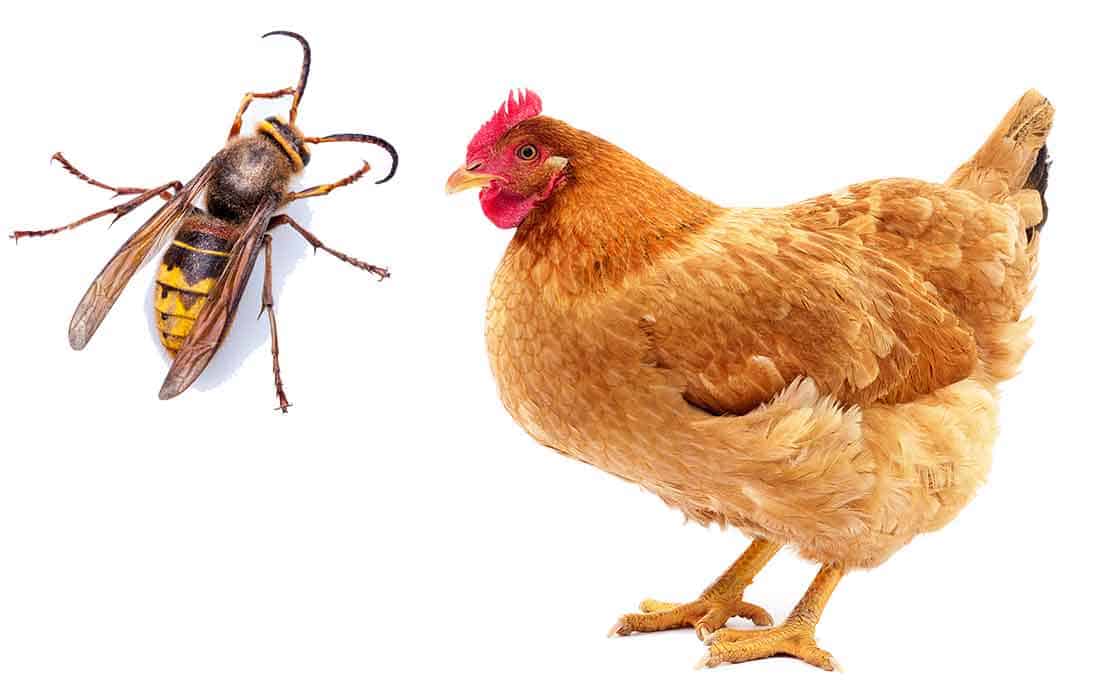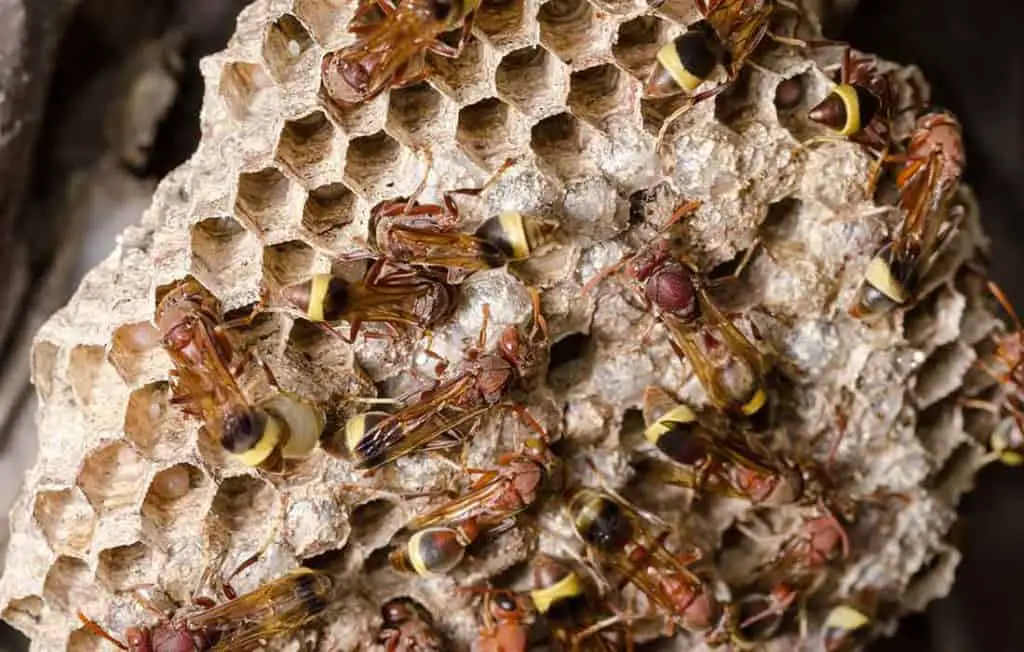One can’t help but worry about their chickens. After all, they are out there, exposed to the elements. They encounter it all: bees, bugs, wasps, mosquitos, parasites. Can wasps hurt chickens? If so, will they require medication? And what can you do to get rid of wasps from the chicken coop?
Can Wasps Hurt Chickens?
Like us, when stung by a bee or wasp, a chicken can have an allergic reaction in the form of itchiness, swelling, redness, and warmth. If a wasp continually stings a chicken or stings a chick, it could be fatal.
Unlike us, a chicken’s immune system will not respond to medicated histamines. Instead, you’ll want to opt for the best treatment, which we’ll discuss below.

*This page contains affiliate links to products I recommend. If you purchase something from this page, I may receive a small percentage of the sale at no extra cost to you.
We’ll also look at what you can do to protect your flock’s coop to prevent them from getting stung. But first, you should have a complete understanding of the differences between wasps as bees.
Wasps Vs. Bees
Bees and wasps, what’s the difference? Is there one, and which one will hurt your chickens the most?
Bees
Many confuse wasps and bees. Bees are usually the ones that are most commonly identified and that people are most familiar with- The black and yellow striped little guys.
The most common types of bees out there are bumblebees, honey bees, and carpenter bees. The honey bees are typically more orange and brown than they are black and yellow.
Both bumblebees and carpenter bees have a round shape and are generally black and yellow flying insects.
They can appear to be fuzzy too. Most of the time, if you see a bee, it is a honey bee.
All bees are about a quarter of an inch to a full inch long. Honey bees are typically found hanging out in a hollowed tree, and bumblebees prefer little cavities in structures.
Carpenter bees are attracted to wood, as they love to nest in all different kinds of wood, even decayed trees. All bees are attracted to the nectar in flowers and will bounce around from flower to flower.
While bees may sting your chickens, they are not as aggressive as wasps.
Wasps
The wasps look a little different. First, it is essential to note that hornets and wasps are not the same. A hornet is a specific kind of wasp.
Size usually is what differentiates the difference between hornets and wasps. Hornets tend to be much larger than wasps.
Next to each other, you can surely see the difference. Wasps can be all black or may have random white, yellow, or orange markings.
For the most part, hornets tend to be much more social than wasps. Wasps don’t stick together with other wasps.
They tend to hang out by themselves. Wasps do not appear to be fuzzy as bees do.
Where are Wasps Commonly Found?
As mentioned, wasps stick to themselves for the most part.
They build their nests in bushes, gutters, and even along fences, which can at times be close to chicken coops. Little hidden nooks and crannies in the coop can also foster a wasp nest.
Yellowjacket wasps are known to make their nests in the ground, significantly increasing the chances of wasps being around the chickens.
Here’s the main difference between bees and wasps: wasps do not lose their stinger when they sting a chicken, and bees do. It means that wasps can sting again right after they sting, which makes them deadlier.
When a bee stings a chicken, the stinger detaches inside the chicken and will continue to excrete venom in the chicken’s body until that stinger is removed.
It can cause a great deal of pain and discomfort to the chicken, including redness, itching, and even swelling.
When a wasp feels that they are threatened, this is when they will sting more than once.
Wasps will attack a chicken if they come too close to their nest or contact a wasp. This is highly likely, especially since your chickens spend all days out in the outdoors. It increases their chances of getting stung.
The venom released by a wasp is different. Wasp stinger venom contains a particular type of enzyme that affects the nerves of your chickens.
The venom can break down the cell membranes. It is just painful for the chicken and can induce a reaction.
What Will Happen To My Chickens If They Are Stung?
Even though chickens have a thick coat of feathers, they still can potentially be stung by a wasp.
If your chicken is stung by a wasp, their immune systems react differently than a human does. When a chicken gets a wasp sting, antihistamines typically do not work as they would with a person.
They will still experience itching, burning, irritation, and inflammation. A chicken may even become lethargic and noticeably uncomfortable.
How To Treat A Wasp Sting On A Chicken?
Most vets will prescribe Meloxicam to assist with the swelling and inflammation chickens encounter with bee stings.
Meloxicam is a non-steroidal anti-inflammatory drug (NSAID) used in treating pain and inflammation in poultry. A veterinarian would typically issue this if the stings were really bad and let you know the proper dosage to give to your chickens.
However, many vets recommend some TLC, and the chicken will recover on its own.
How Do I Keep Wasps Out Of My Chicken Coop?

However, just because chickens don’t seem to be affected too severely from wasps or bee stings. It’s essential to take precautions to ensure the coop doesn’t become overtaken by them.
You especially want to ensure your baby chicks are protected, as a sting can kill them.
When deciding how to protect your chickens from wasps, it can be tricky to make sure that you do not use any solutions that can be toxic to your chickens and wind up harming them.
It’s best to implement any of these techniques during the day. Your chickens will be outside foraging and won’t have to be in the enclosure while you’re getting rid of the wasps.
Let’s take a look at some safe solutions!
Essential Oils
Blending lemongrass oil, geranium oil, and clove oil act as a fantastic wasp repellent.
Mixing a generous amount of each with water in a spray bottle and then spraying down areas of the coop and where your chickens typically roam.
Be sure to focus on the areas where wasps typically build their nests. Essential oils can also be used to get rid of cockroaches in chicken coops.
Peppermint oil is also useful, according to the Journal of Pest Management Science. Just dilute a few drops with water, and spray.
Soap and Water
Soap is said to clog the pores wasps use to breathe, called spiracles. Mixing up a soap and water solution is effective to spray in all areas of the coop.
Wasp Traps
Wasp traps are sold in many stores and online and essentially lure the wasps into a container. These solar powered wasp traps are inexpensive and work well.
You can put them up anywhere in the coop and not have to worry about your chickens. They work for wasps as well as other insects that can be bothersome to your flock.
It entices wasps with a “treat” that lures them in and does not allow them to get out. You can hang them or play them in areas where you notice many wasps or wasp nests.
Some people will trap the wasps and feed them to their chickens.
Seal Up Food At Night
Wasps tend to be attracted to food sources. Be smart about taking away or sealing up chicken food at night.
Opened food can also attract mice, rats, squirrels, and other rodents.
Rubbing Alcohol
Pour 91% rubbing alcohol in a spray bottle and spray it directly on the hive. It kills the insects quickly, and then you can remove the hive.
Knock Down Nests At Night
Wasps, like chickens, are much less active and aggressive at night time. After the sun has set and the chickens are all tucked in for the night, you can go about trying to knock down wasp nests safely.
You will need to act carefully and wear protective gear and clothing. Don’t use a flashlight—the flashlight signals to the angry wasps where you are.
Tip: if it is cold outside, the wasps tend to move a lot more slowly, which can work in your favor.
Use the Vacuum
Add two tablespoons of cornstarch or one teaspoon of talcum powder to a dry vac, depending on the nest size. Use the vacuum to clog the holes in the nest.
It’s best to do this before dawn when the wasps are less active. Once the nest is empty, you can caulk the openings. A strong vacuum can suck the insects from inside the enclosure; just be careful as you will make them aggressive.
Final Word
Overall, wasps are not reported to be a considerable threat to chickens, especially considering that they can usually recover on their own if they are stung. That being said, a wasp and bee sting can be fatal to a young chick.
Knowing the difference between bees and wasps helps you understand what you are dealing with inside your coop, helping you decide how to handle them.
Luckily, there are many remedies, some you can even whip up right at home, that can help you get rid of any wasp problems you may have around your coop and chickens.
Overall, protecting your chickens is essential. Be sure to keep them safe!